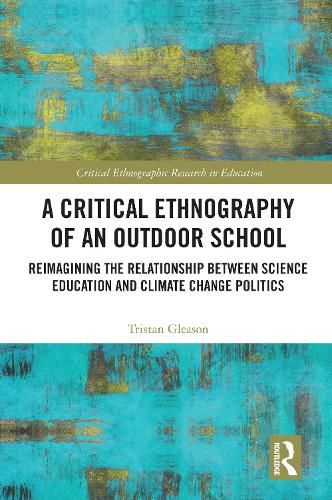Readings Newsletter
Become a Readings Member to make your shopping experience even easier.
Sign in or sign up for free!
You’re not far away from qualifying for FREE standard shipping within Australia
You’ve qualified for FREE standard shipping within Australia
The cart is loading…






By using critical ethnographic research to explore the practices and policies that sustain a residential outdoor school in the United States, this book problematizes the relationship between science education and climate change politics in the United States.
Weaving together empirical data from fieldwork with theoretical resources spanning the sciences and humanities, this book demonstrates how community activism, political alliances, and policy changes have guaranteed the survival of an outdoor school in Oregon. This example enables artful reexamination of the relationship between science education, politics, and policy more broadly, as well as the relation of science education to climate change politics in particular. Gleason ultimately reconstructs science education towards epistemic and ontological pluralism, and illustrates how critical ethnographic research can instigate a reimagining of the relationship between curriculum and how we relate to the world.
This book will benefit researchers, academics, and educators in higher education with an interest in the philosophical underpinnings and implications of science education, environmental education, and educational policy more broadly. Those specifically interested in critical ethnographic research will also benefit from this book.
$9.00 standard shipping within Australia
FREE standard shipping within Australia for orders over $100.00
Express & International shipping calculated at checkout
By using critical ethnographic research to explore the practices and policies that sustain a residential outdoor school in the United States, this book problematizes the relationship between science education and climate change politics in the United States.
Weaving together empirical data from fieldwork with theoretical resources spanning the sciences and humanities, this book demonstrates how community activism, political alliances, and policy changes have guaranteed the survival of an outdoor school in Oregon. This example enables artful reexamination of the relationship between science education, politics, and policy more broadly, as well as the relation of science education to climate change politics in particular. Gleason ultimately reconstructs science education towards epistemic and ontological pluralism, and illustrates how critical ethnographic research can instigate a reimagining of the relationship between curriculum and how we relate to the world.
This book will benefit researchers, academics, and educators in higher education with an interest in the philosophical underpinnings and implications of science education, environmental education, and educational policy more broadly. Those specifically interested in critical ethnographic research will also benefit from this book.